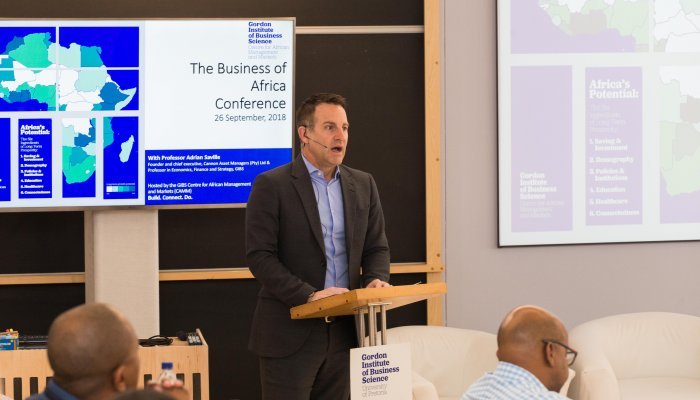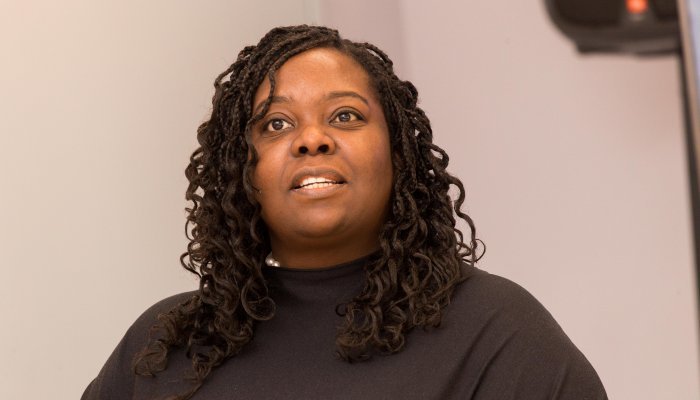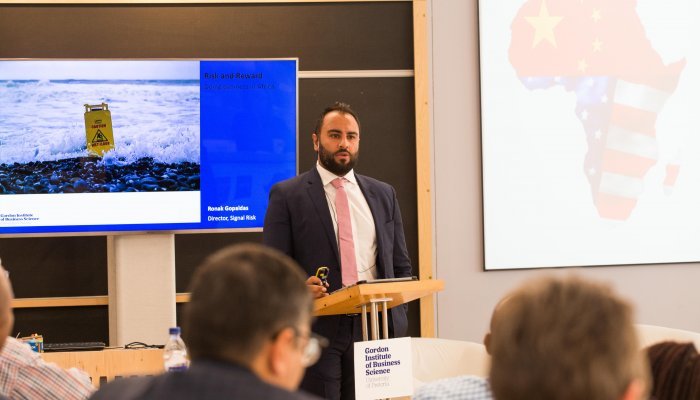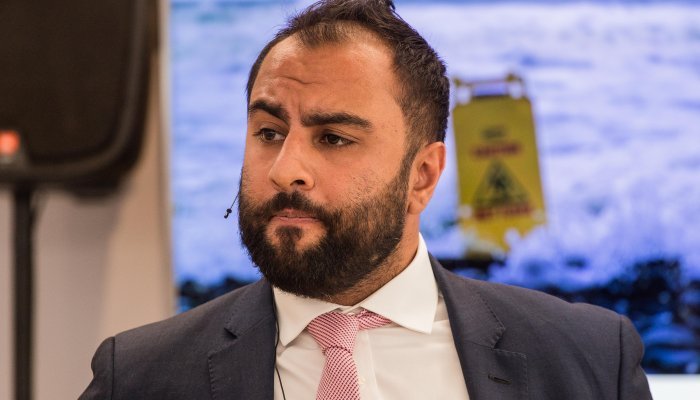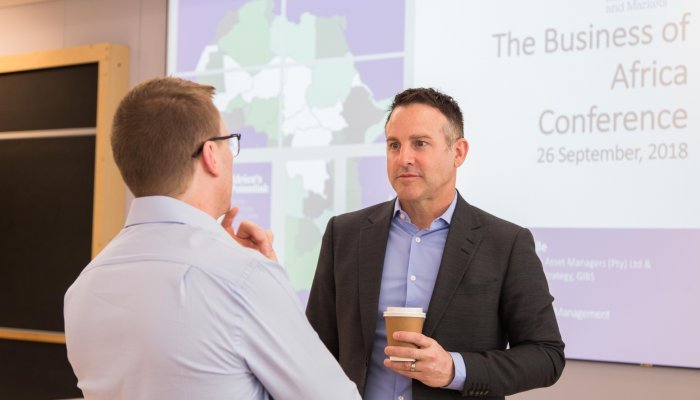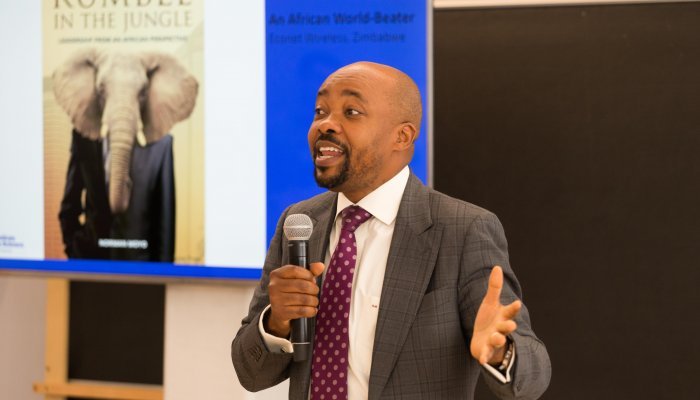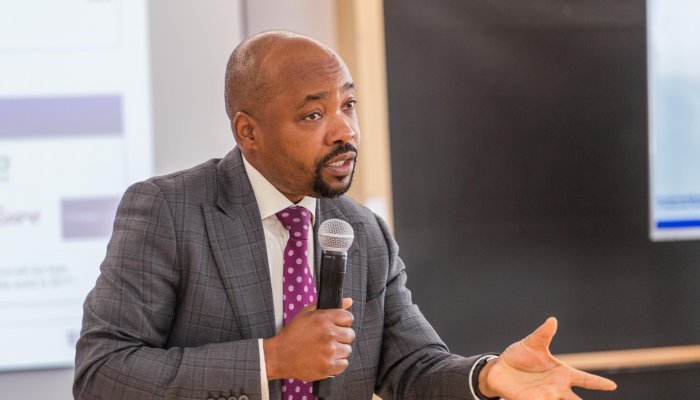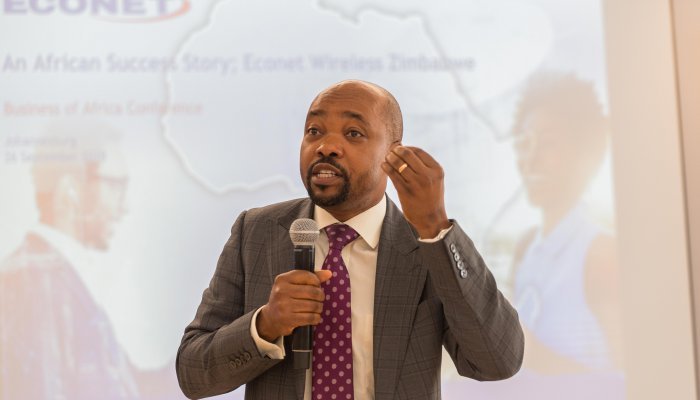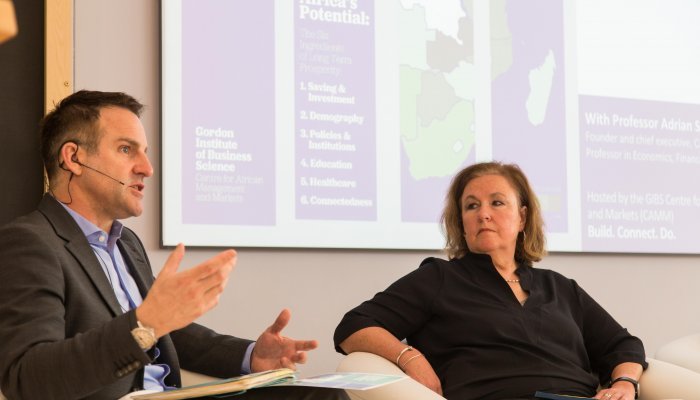In September 2018, Dr. Adrian Saville, GIBS Professor in Economics, Finance and Strategy and the founder and chief executive of Cannon Asset Management, launched the GIBS Centre for African Management and Markets (CAMM). As part of the launch, GIBS turned the spotlight on providing Africa-focused insights during its Africa Conference. While many issues and prospects were raised, several key trends emerged.
To ensure robust debate, much of the discussion was held under the Chatham House Rule, with the exception of the formal presentations.
Growing economies
Made up entirely of emerging market economies, Africa’s complexity is compounded by internal structural challenges and geopolitical factors which are often out of the continent’s control. Ronak Gopaldas, director of Africa-focused intelligence firm Signal Risk and a fellow at the CAMM, explained that Africa’s economies were affected by five primary factors:
1. African politics
2. Geopolitics
3. Economic policies
4. The generational divide (the average age of the population is 18.7 years while the average age of an African president is 62)
5. Technology and the Fourth Industrial Revolution.
In addition, Gopaldas highlighted regional trends of which investors should take note. West Africa, he pointed out, was opening up its economies and embracing democracy and regime changes, whereas East Africa appeared to be regressing in terms of democracy, and becoming far more authoritarian. Restrictions on social media platforms, greater nationalism and autocratic leadership were examples of this. Southern Africa, on the other hand, has seen the removal of its liberation governments. In oil-rich Angola, the Dos Santos family has been unseated, Zimbabwe’s Robert Mugabe was removed from power in late-2017 and in South Africa the African National Congress also appears to be losing its certain grip on power, especially in the major urban centres (although a recent poll indicated that President Cyril Ramaphosa was finding increased favour among voters).
These regional, ideological differences are highlighting a growing view that democracy is not the panacea for Africa’s problems. Many people, including former Nigerian president Olusegun Obasanjo, feel that democracy does not equate to growth and development. The likes of Obasanjo cite Rwanda and Ethiopia, two of the continent’s fastest-growing countries, as examples of why benevolent dictatorships are more beneficial to Africa and its growth. Obasanjo, a keen follower of the economic philosophy espoused by Singapore’s Lee Kuan Yew, believes Africa needs strong, decisive leaders who are in power long enough to allow for the policy continuity so vital for young, up-and-coming countries.
It appears that Africa is starting to grapple with what economic and political ideologies will best work for it, and the two fastest-growing regions, East Africa and West Africa, appear to be moving in different directions.
Economic unity
Compared with other global economic regions, Africa has the lowest rate of intra-regional trade, at a mere 15%. North America has 55% intra-regional trade, the European Union boasts 63%, South East Asia has 65% and South America comes in at 18%.
There is almost universal agreement that the best chance Africa has of creating an economically secure and sustainable future is through regional integration. Greater intracontinental trade will offer the continent its best defence from falling prey to global economic glitches. However, the continent’s track record when it comes to regional integration has been questionable, to say the least. Of the eight existing (and overlapping) regional economic communities, the Economic Community of West African States (ECOWAS) and the East African Community (EAC) are the two regions that have made the most progress, while the Southern African Development Community (SADC) has not met a single target that it set out for itself since 2008.
...East Africa appeared to be regressing in terms of democracy...
But this has not discouraged Africa in its desire to be an economically united continent, an aim embodied by the ambitious African Continental Free Trade Area, which, if it works, could be a game changer for trade and investment. However, it was noted at the Forum that these goals are overly ambitious and are built on very unsteady foundations.
A major hurdle to successful regional integration appears to be a lack of trust and transparency between African states. Everyone is talking unity, yet nobody wants to open their borders to the free movement of people and goods. There is a massive disconnect between what is happening at state level and the feeling on the ground. This was highlighted during a panel discussion in which it was noted that Africa has poured huge amounts of capital into becoming a big ‘S’ in BRICS, rather than a small ‘s’. In other words, the focus on global issues has taken precedence over grassroots level issues that actually make things work.
The result, despite having had regional economic blocs in place for decades, is that African states have failed to accomplish any meaningful unity on the continent and – besides issues like visa-free travel, preferential tariffs and taxes encouraging greater African trade – doing business in Africa for Africans is harder than doing business in a country like Russia, the panel stressed.
It was also noted that Africa’s leaders are largely reactionary, rather than proactive. “I think there is a significant issue of people making reforms in times of crisis. When things are going well, everything gets put on the back burner. Stop-start reforms simply won’t work,” one panellist said.
So, the conclusion is that African countries have to start creating policy frameworks that encourage cohesion within regions and the continent.
A final point around regional integration is that increasing African nationalism is a further hindrance to any cohesion on the continent. Instead of working to achieve continental economic stability, countries are competing with each other to get donors. So while leaders talk about cohesion and a united Africa, the reality is that countries are actively competing with each other.
Potholes along the road to economic stability
Although each African country offers investors unique challenges, there are a number of common themes that leaders across the continent are going to have to tackle if they wish to ensure the continent’s economic stability and growth.
· The demographic dilemma – The average African is 18.7 years old and, in a continent which has the world’s fastest-growing population, this heavy youth skew and booming population can be regarded as either an asset or a burden. The population explosion, combined with rapid urbanisation, means cities have to develop quickly to accommodate larger populations. Governments need to plan for rapid infrastructure development to facilitate this move.
· Policy vs certainty – Policy certainty and implementation also need to be addressed; with the need to rectify the huge disconnect between ambition and effective implementation. Making things happen was an important discussion during the Forum during which South Africa was accused of being a ‘policy junkie’. “Policymaking is a national sport. We are good at designing and thinking, the rest of the continent is not dissimilar,” was one comment. In addition, the private sector was urged to get involved as the “public sector cannot reform on its own”. It was also said that the African private sector should be holding the public sector to account. “Trade can be completely derailed without the correct policies,” said another delegate.
· Systemic challenges – Currently African infrastructure is set up to favour an extraction economy, yet this does not feed inclusion, economic growth and integration. An example is the fact that in South Africa it is cheaper to export iron ore to China than it is to a smelter in Vanderbijlpark. This is leading to a lack of beneficiation capacity, be it minerals, food or textiles. So Africa is exporting raw goods and importing almost 100% of its end-use requirements. This, it was agreed, is one of the biggest inhibitors to Africa economic growth.
· Support industrialisation – Finally, a lack of industrialisation policies are also making the continent import dependent. Nigeria is an excellent example of this. The country has designed its trade policies to foster industrialisation, and implemented import bans, but it has not developed the mechanisms to drive industrialisation. One person noted: “Economics is to politics what gravity is to jumping. There is synergy but you need the infrastructure to do it… you need policies, or at least government should not get in the way of doing business.”
...Africa has the lowest rate of intra-regional trade...
These challenges, however, are typical of emerging markets. While some are incredibly complex and need greater out-of-the-box thinking to resolve, others are easier to address. The solutions that came out of the Forum included:
· Developing more credible leaders who understand the continent.
· Ensuring policy certainty and continuity
· Creating well-developed and inclusive financial markets
· Building strong judicial and legal frameworks
· Focusing on education, especially in the STEM (science, technology, engineering, maths) fields
· Fostering greater innovation to address continent-specific issues
· Building better and more universal healthcare
· Increasing investment into affordable and accessible telecoms and communications.
...Africa’s leaders are largely reactionary, rather than proactive.
10 questions to ask before moving into a new African market
1. Have you secured the right business and legal partners to help you understand the cultural nuances of the country you are about to enter?
2. How strong are this country’s financial and banking sectors? Will you have access to finance?
3. What are the country’s foreign exchange rules? How easily can you repatriate your money?
4. Does this country offer policy certainty, or will policies chop and change every five years where your business model works on a 10 to 20-year plan?
5. How strong are this country’s legal and judicial frameworks? How easily will your business be able to settle disputes?
6. What is the business and legal language of the country?
7. Does this country offer a big enough market to support your business and is it accessible to other international markets?
8. How business friendly is the country and does it offer your business the right infrastructure to conduct business, be it roads, telecommunication, or property?
9. What are the skills levels of the workforce in this country and do they match your business requirements?
10. What are this country’s visa and immigration policies? Will your senior management, and their families, be able to live and work in this country?
An eye on Africa’s top 20 investment destinations
Celeste Fauconnier, Rand Merchant Bank (RMB) Africa Analyst, talked delegates through the countries RMB regarded as being the most promising investment destinations in Africa. The 2019 Where to Invest in Africa report lists the top 20 investment destinations in Africa by examining economic activity, as well as a country’s operating environment.
1. Egypt: There have been good reforms in Egypt. They have a large market and are well-positioned in terms of Europe and the Middle East.
2. South Africa: Although it is experiencing weak macroeconomic performance, it still has the best business environment in Africa.
3. Morocco: It has a very strong financial district, and reforms after the Arab Spring have seen it jump into the report’s top five.
4. Ethiopia: Has made major investments into urban areas and industry. Growth is expected to exceed 8% over the next five years. It is still difficult for investors to repatriate money.
5. Kenya: It has the most diversified economy in Africa, and has strong GDP growth. However, its banking system is a problem.
6. Rwanda: This country has made the most reforms of any country in the world in the past decade. But is still a very small economy of only 11 million people.
7. Tanzania: Although still in the top 10, it is becoming increasingly nationalist. The country is also penalising mining companies with exorbitant fines.
8. Nigeria: Although it is becoming more business-friendly, the country has complex and confusing legislation. It is difficult to repatriate money.
9. Ghana: Although its economy has slowed, its non-oil sectors are still strong and the country is investing into financial services, gold and cocoa.
10. Côte d’Ivoire: It is the largest cocoa producer in the world. Its government is investing into its own industries. Its currency is pegged to the euro.
11. Tunisia: Has made many structural changes to attract foreign investment, but it still has inefficient government bureaucracy.
12. Mauritius: This country should be in the top 10 but has a very small market, which does not offer the same opportunities as other countries.
13. Botswana: Has some of the best-performing banks in Africa even with a small population of only four million people.
14. Uganda: Has fallen from 11th spot due to the slow development of oil infrastructure, and growth is not in line with East African peers.
15. Algeria: Is economically stable and offers attractive investment opportunities, but access to finance is its biggest inhibitor.
16. Senegal: One of Africa’s fastest-growing economies, but access to finance can be problematic.
17. Zambia: It is one of the least diversified countries in Africa. A fall in copper prices has put pressure on the country to repay its debt and increased the threat of default.
18. Cameroon: Has seen increased political stability and has abundant natural resources, but corruption is still an issue.
19. Burkina Faso: It is a fast-growing economy, and is offering tax and legal benefits. However, access to financing is a problem.
20. Angola: Its change in government and more business-friendly environment has seen it enter the top 20. It is difficult to repatriate money.


